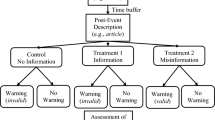Abstract
In this essay I will argue, as does Bernard Williams, that lying and misleading are both commonly wrong because they involve an aim to breach a trust. I will also argue, contrary to Williams, that lying and misleading threaten trust differently, and that when they are wrong, they are wrong differently. Indeed, lying may be wrong when misleading is not.
Similar content being viewed by others
Notes
Williams (2002, 108) recognizes that there may be exceptional contexts in which a lie is worse than a misleading statement that has the same effect, but he limits these to friendly adversarial settings, such as a parliamentary debate, a context not relevant to Athanasius.
I here treat “telling,” “asserting,” and “saying” as equivalent, though I recognize that there are contexts in which distinctions among them matter.
There is perplexing moral symmetry here. Frank avoids giving Sadie an unfair advantage by withholding information from her. In doing so, he seems to get an unfair advantage over her, because his nondisclosure causes her to bargain on the basis of the idea that the value of her land should be understood in terms of the price it would bring in the market of homes sold for personal use. My sense is that the fair market value of the house is less than Sadie would get if she shrewdly bargained on the basis of the information that her land was desperately needed by Disney, and more than Frank would get if he shrewdly bargained on the basis of the information that the house would serve only personal use. So either Frank gets an unfair bargaining advantage if he does not disclose, or Sadie gets one if he does. An unfair advantage seems unavoidable. That may partly explain why it seems so hard to avoid dirty hands in business — in competitive environments, one often can avoid putting others at an unfair disadvantage only by accepting one’s own unfair disadvantage. What Frank should do, I suppose, is take the unfair advantage, but not exploit it, and instead give Sadie a fair price. There can be no reason for Sadie to feel secure about that prospect. And Frank’s generosity in pricing may raise Sadie’s suspicions, eroding Frank’s bargaining position.
References
Geach P (1977) The virtues. Cambridge University, Cambridge
Grice P (1989) Studies in the ways of words. Harvard University, Cambridge
Moran R (2005) Getting told and being believed. Philos. Impr. 5:1–29
Strudler A (2005) Deception unraveled. J. Philos. 102:458–73
Uniacke S (1994) Permissible killing. Cambridge University, Cambridge
Williams B (2002) Truth and truthfulness. Princeton University, Princeton




